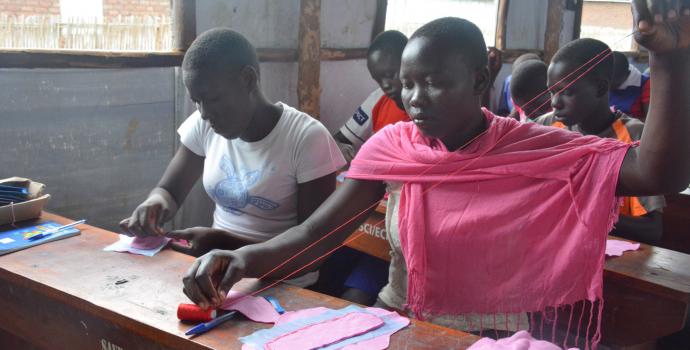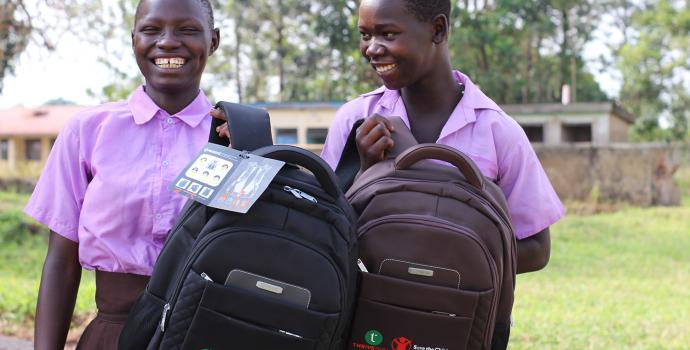Why menstrual hygiene matters for keeping girls in school

Taboos on menstrual hygiene are keeping girls out of school. Rachael Corbishley, manager of the NGO Education Consortium in Uganda, explains:
Imagine being in the middle of your science class and your period starts. There’s no clean water to wash, no proper toilet to use, and you don’t have any pads. Sadly, that’s the reality for many refugee girls in Uganda.
As we call on education leaders, countries and other key partners to take action on Menstrual Hygiene Day, it’s important to remember the specific needs and risks for refugee girls, displaced girls, and girls whose dignity and access to the safety and opportunity of an education are being pushed aside by taboos, misconceptions, and lack of proper training and materials.
Uganda is home to 1.25 million refugees. Inadequate access to clean and safe hygiene facilities, shame and embarrassment while on their period, and lack of sanitary materials are some of the main reasons that adolescent refugee girls give for why they do not attend school regularly here. Girls across the country do not attain success at primary school at the same rate as boys. In the Primary Leavers’ Exam, a national examination that all children in school sit at the end of Primary 7, boys consistently pass at a higher rate than girls. Education disparities between boys and girls increase as they get older, as is seen in the Accelerated Education Programme (AEP).
The AEP is an approach funded by Education Cannot Wait and other donors to help children that previously dropped out of school to attain a basic education. It provides age appropriate learning for children aged 10 to 18 who had their education interrupted due to poverty or conflict, and condenses seven years of the Ugandan Primary curriculum into three years. Data from the programme shows that girls are less likely to sit for the Primary Leavers’ Exam in the first place (72 per cent of all learners that sat for the exam across 13 centres in December were boys) and then are less likely to pass when they do sit (48 per cent of girls passed the exam, as opposed to 72 per cent of boys).
With funding from Education Cannot Wait, NGOs in Uganda are working to address these challenges and reverse these trends. Uganda’s Education Response Plan for Refugees and Host Communities includes activities for “menstrual hygiene management” to enable girls to stay in school.
What does Menstrual Hygiene Management look like in practice?
Globally, half a billion women and girls lack adequate facilities for menstrual hygiene management. If those girls and women were to join hands, they would stretch clear around the globe – 10 times!
We need some no-nonsense approaches to ensure universal menstrual dignity – especially for girls living in crisis settings. First, schools need to have appropriate water, sanitation and hygiene facilities, but in poor rural environments sometimes this isn’t the case. At a bare minimum, it is critical that toilets are separate and clearly sign-posted for both boys and girls and male and female teachers; that the doors have locks and are well lit; and that there is a space and clean water for washing and changing, and that there is a means for girls to dispose of sanitary materials.
Next, girls need to have access to suitable sanitary materials. The Education Cannot Wait-funded programme is bringing together a range of different approaches to menstrual hygiene and different partners across Uganda are trialling different methods. One approach is to distribute reusable sanitary materials to girls. The packs often come with soap and knickers to ensure that the user is able to hygienically wash the pads. Another approach is to train girls and their teachers on how to make their own reusable sanitary pads from locally available materials. Menstrual cups are a relatively new approach in northern Uganda, and through this programme girls will be introduced to the cup and trained on its use.
These different options are not mutually exclusive. Girls have the right to be provided with a choice between options and enough information and counselling to make a well-informed choice. Thanks to Education Cannot Wait’s support for these menstrual hygiene management activities, more than 18,000 girls in Uganda will access these rights.
Providing information is a critical part of the solution
It is really important that we do not just hand out sanitary materials, without accompanying this with training, counselling and guidance. Girls need to understand what is happening to their bodies during menstruation – and why. It is also critical that boys, as well as male teachers and members of school management have a good understanding of menstruation as well as the needs of girls. This programme will train all stakeholders in the school community on menstrual hygiene through information sessions. By bringing boys and men on board, too, this can reduce stigma, embarrassment and shame. Involving the whole community has also then resulted in school management committees taking steps to ensure that sanitary materials are included in school budgets and school improvement plans.
When this all happens it can make a huge difference not just to girls’ attendance and attainment at school, but also their self-confidence and active participation in class.
This blog was originally posted at Education Cannot Wait




